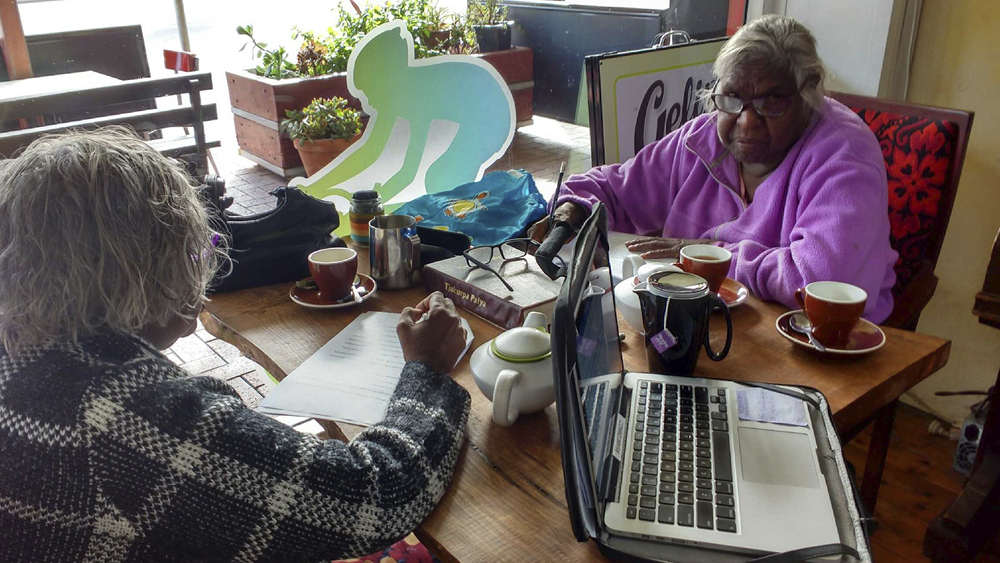Nami's tears of joy as Bible app brings good news
‘My children and grandchildren will be able to hear me sharing the gospel with them.’
Nami was moved to tears when she heard her own voice narrating the Gospel of Mark in the new Pitjantjatjara New Testament Audio.
When Bible Society’s Louise Sherman played the audio to Nami on her phone, she sat quietly while Louise drove.
“I am crying because I am so happy.” – Nami
“The occasional ‘wiru’ (wonderful) and ‘palya’ (good) escaped her lips. It was only when I pulled up that I realised Nami was in tears,” recalls Louise, who is Bible Society Australia’s Remote and Indigenous Ministry Production Coordinator.
“She smiled and said ‘I am crying because I am so happy. Even once I am long gone, my children and grandchildren will still be able to hear me sharing the gospel with them.’
“She wiped her tears, smiled and said, ‘This is rikina!’ (This is superb!)
“Many of the Pitjantjatjara (Anangu) people we met were overwhelmed when they heard the voices of their relatives on the recording,” adds Louise, who recently joined a roadshow taking the new Bible app to Aboriginal communities in the APY (Anangu Pitjantjatjara Yankunytjatjara) Lands in South Australia.
Bible Society’s Translator and Bible Engagement Coordinator, David Barnett, had some very encouraging experiences while visiting eight Aboriginal communities east of his base in Ernabella. (A second team visited 11 communities west of Ernabella.)
“We were just helping people to install the Bible app on their phones and also hand out to church leaders and schools these ‘proclaimers’ – which are little black boxes with speakers that can run off solar, which include the recently recorded New Testament,” he says.
“It was fantastic to see how much encouragement it actually brought them.” – David Barnett
“We arrived at Titjikala and there was a sorry camp on, which was basically a time when people mourn someone who has passed away recently.
“The pastor there had lost his wife and we gave him one of these proclaimers and he was thrilled to have the Scriptures to encourage him at that time when he was grieving the loss of his wife.
“All his family were sitting around and they put it on and listened to the Gospel of Matthew and it was fantastic to see how much encouragement it actually brought them.”
David said he was reminded during the recent launch of the Bible app in Adelaide how powerful it can be to hear, as opposed to read, the word of God.
“It was the first time a lot of them had heard the Scriptures in their language and it dawned on them how important this was, how significant it was for their families,” he says.
“I think often in the West we forget that, for most of the history of the church, people actually haven’t had access to printed Scriptures. So, for a long time, faith has come by hearing and not necessarily by reading the Scriptures. There’s something powerful about having the word proclaimed orally.
“I don’t think we should underestimate the impact this new recording might have.”
David has noticed how the Audio Bible has further intensified the enthusiasm of the 30 or 40 translators who are involved in translating the Pitjantjatjara Old Testament.
“Part of my role in the project is to produce front translations for them to work from – these are English translations that can be easily adapted into Pitjantjatjara – and there’s such a great demand at the moment for people to have the Bible.
“A lot of people are wanting to get involved and I’m struggling to keep up with the translations – a good problem to have!”
More than half of Aboriginal and Torres Strait Islander peoples are Christians (54 per cent, according to the 2016 census), but most have never heard the Bible in the language of their heart. With the recent launch of the Kunwinjku New Testament in Arnhem Land, 17 Indigenous communities now have a New Testament in their language. However, there is only one full Bible in an Aboriginal language – Kriol – which means thousands of Christians are missing out on God’s word.
More than 20 Indigenous Bible projects need urgent funding to equip our brothers and sisters to share the Bible their way, through art, storytelling and in their lives every day.
Make a Donation
Can you help support the work of the Remote Indigenous Ministry Support team? As well as publishing and distributing Bibles and recording Indigenous Scripture in audio, the team supports translation of the Bible into more languages, and prepares special Bible resources.


